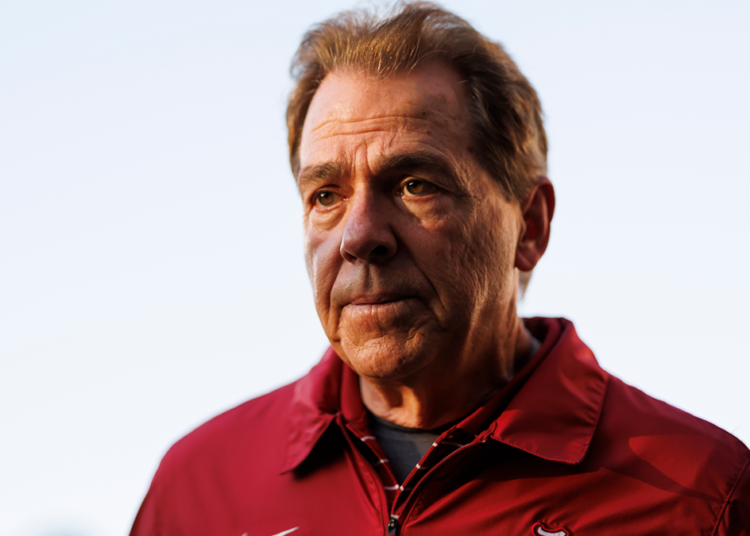In a guarded moment a few years ago, Nick Saban revealed one of his biggest fears.
Can you imagine, he said, if one of his Alabama teas ever went 8-4? For virtually any other coach, that’s not terrible. For Saban, it’s acceptable.
That’s not the level he established at Alabama. That’s Gator Bowl-level stuff.
While that prospect may have scared Saban, it also motivated him — so much that he got out before anyone could stamp him with any type of expiration date. He got out in time to preserve his legacy as the greatest college coach of all time.
Not just college football. All of team sports. Certainly now. Maybe forever.
There will be few doubts after Saban, 72, stepped down Wednesday following his 17th season at Alabama. He leaves with 292 wins, the 15th most all time, four Heisman Trophy winners and 49 players selected in the first round of the NFL Draft. His achievements are comparable to Joe DiMaggio’s 56-game hitting streak.
Saban’s seven national championships, six at Alabama (matching Paul “Bear” Bryant) and one at LSU, is a record unlikely to ever be broken. It might as well be written in stone, especially in an era where it has never been more difficult to win a national championship.
Saban cornered the market on titles, but he did it during the most competitive period in college football history. He’s responsible for much of that. Recruiting has never been more intense. Still, Saban and Alabama largely dominated with by far and away the most top-ranked classes (10) since 2010. Though the stretch was started by Florida, the SEC has won 13 national titles across the last 18 seasons with Alabama’s six account for nearly half of that accomplishment.
The former Kent State defensive back from Fairmont, West Virginia, has at the center of it all, ruling his sport like no other coach before him. It took Bryant 22 years to win his six national championships. Saban did it in a 12-year span at Alabama.
Game, set, match that, college football!
It won’t. Beginning this season with the expanded 12-team College Football Playoff, it will become even more difficult to raise the trophy at season’s end.
Saban stepped away before he would have participated in his fourth different postseason era — the old bowl system, BCS, CFP and expanded CFP. He coached in eight bowl games, won three conference titles and a national championship before taking over Alabama.
And he was a second choice! Back in December 2006, Rich Rodriguez had taken the Alabama job only to have second thoughts after about a week, returning to West Virginia.
Imagine that, Saban being the backup plan.
He’s taken 72 trips around the sun but looks 20 years younger than that, and given his energy level, some might say he acts even younger still playing noon basketball with his staff. Those legendary games included some of the most powerful and talented coaches in the game. Somehow, Saban’s team usually won.
Saban may have been a taskmaster, but his staff wasn’t dumb.
Along the way, the great coach established an immense coaching tree along with a de facto halfway house for coaches who had met personal and/or professional adversity. Perhaps the most notable “graduate” of that latter group is Texas coach Steve Sarkisian, who brought his team to the CFP this season.
Sarkisian, who will be a candidate to replace Saban until he’s not, arrived at Alabama in 2016 after being fired at USC. His battle with alcohol had become public, but Saban had faith. Sark did well enough to get the Atlanta Falcons’ job the next year before bouncing back to Bama in 2019. It was there he coached Tua Tagovailoa, won the Broyles Award as the nation’s best assistant and was the offensive coordinator for the 2020 national champions.
The most successful branch from Saban’s tree is Georgia coach Kirby Smart, who spent 11 seasons coaching under Saban at three stops, his last eight as defensive coordinator at Alabama. Smart was hired away by his alma mater in 2016. Since joining the Bulldogs, he has gone 94-16 (56-9 SEC) with a 42-2 record and two national championships over the last three seasons.
When Alabama didn’t win it all in 2023, it marked the first time in playoff era that Saban had gone without a national championship across three straight seasons. For any other coach, participating in the CFP would be enough. At Alabama, Saban competed not just against the other 132 FBS teams but his own standard.
Georgia failed to threepeat because Alabama upset it last month in the SEC Championship Game. That 27-24 result will go down as Saban’s 292nd — and final — win. (His career total is 297, though five victories from the 2007 season were vacated.)
The Crimson Tide were right there again on Jan. 1, losing the Rose Bowl semifinal to Michigan, 27-20 in overtime. The way game ended was both heartbreaking and an indicator. Alabama had a seven-point lead with 4:41 left in the game with Michigan on its own 25-yard line.
Somehow, the Wolverines became the team of destiny, winning the CFP National Championship this week. Still, a Tide team that was written off just weeks into the season — having lost a Heisman Trophy winner (Bryce Young) and the defensive player of the year (Will Anderson Jr.) from their 2022 roster — finished 12-2 and won the SEC.
That’s not 8-4. Not even close.
But the game is for the young guys. Smart, 48, is almost a quarter century younger. Michigan’s Jim Harbaugh, 60, is a decade-plus short of Saban. Sarkisian, 49, is just hitting his peak.
Saban didn’t want to be Willie Mays hanging on too long with the Mets. He didn’t want to be Michael Jordan in obvious decline while in his twilight years the Washington Wizards. He has watched from afar the sad, slow end to the career of his great mentor, Bill Belichick, whose New England Patriots bottomed out at 4-13 this season four years removed from the departure of Tom Brady.
“He saw that,” a source intimately close to Saban recently shared with CBS Sports.
Belichick, 71, seemingly still has the urge. Saban has decided not to allow any additional wear and tear tarnish his gold-plated legacy.
To be in Saban’s circle of trust was like holding membership to an exclusive club. The man himself held the velvet rope to those he could confide in.
I am by no means suggesting I was in that circle, but one moment a few years ago surprised me. I had been asked to appear in person on Saban’s “Hey Coach” radio show, which airs Thursday nights on game weeks.
During a commercial break, he leaned over and said, “Ask me whatever you want.”
Really? Anything? What is a media member supposed to do with that? Let’s just say it wasn’t the time or place to ask what trick plays he had ready for LSU.
One of Saban’s greatest skills was his ability to adapt. In 2014, Alabama had become susceptible to spread option offenses. The coach who once had criticized those offenses — “Is this really what we want the game to be” — turned around and developed one of the powerful such attacks in the game.
In 2014 — exactly 10 years ago to the day he retired — Saban hired Lane Kiffin, who had been fired at USC, as his offensive coordinator with the intent purpose of installing the spread. That year, a converted running back named Blake Sims set the Alabama total offense record. The Tide won the SEC, advanced to the playoff and finished 12-2. A year later, Alabama won Saban won his fifth national title at the school.
Kiffin became another graduate of that Saban halfway house, bouncing to FAU in 2017. In 2023, he led Ole Miss to 11 wins for the first time. That’s just another glimpse at Saban’s coaching tree that might as well be a sequoia by now.
The biggest question emerging from Monday’s bombshell retirement: Who will replace the great coach? There are scores who want the job, but who is qualified? Who wants to succeed Saban?
There is an old saying in coaching: “Never be the guy to follow the guy.” In other words, it’s hard to follow a legend.
The next guy is going to be held to a standard that, in the end, Saban himself decided was too tough to continuously achieve.
Alabama athletic director Greg Byrne has undoubtedly been prepared for this day. He has a short list. The coaching underground is already screaming that Clemson’s Dabo Swinney wants the job. The former walk-on wide receiver from Birmingham, Alabama, is certainly qualified. But is Clemson still on a championship level or in decline?
Washington’s Kalen DeBoer certainly deserves a look coming within a game of winning a national title in his second season with the Huskies.
Oregon’s Dan Lanning seems like the most logical choice. The former Alabama graduate assistant under Saban has won a national championship as a defensive coordinator under Smart at Georgia. He is 22-5 in two seasons with the Ducks.
This coaching search might be followed more than a presidential election … or perhaps we’re aiming too low.
Saban was coaching royalty. Perhaps the best book written on Saban came from former Forbes editor Monte Burke. Saban did not participate in “The Making of a Coach,” but he did not deter Burke from pursuing his story.
Everyone spoke with Burke. Whether you loved or loathed Saban, there were stories worth telling.
And the overwhelming majority love him.
Burke’s book was the most revealing look to date at a legend who stepped down Monday before mediocrity could catch him.
In the end, the decision wasn’t a bombshell.
It was time.
Read the full article here


























